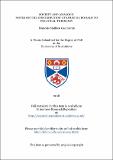Files in this item
Society and analogy : notes on the contribution of Louis de Bonald to political theology
Item metadata
| dc.contributor.advisor | Rengger, N. J. (Nicholas J.) | |
| dc.contributor.author | Sarah, Francois Mathieu Gael | |
| dc.coverage.spatial | [9], 155 p. | en_US |
| dc.date.accessioned | 2019-09-27T08:03:23Z | |
| dc.date.available | 2019-09-27T08:03:23Z | |
| dc.date.issued | 2018 | |
| dc.identifier.uri | https://hdl.handle.net/10023/18570 | |
| dc.description.abstract | Among the counter-revolutionary figures who emerged after the French Revolution, the figure and works of Louis de Bonald (1754-1840), unlike those of Joseph de Maistre, remain shrouded in obscurity. Yet, he was in his own time recognised as the foremost critique of the excesses of the revolutionary period. His attempt at articulating a traditionalist philosophy of society and authority deserve to be better known among scholars if only because of the originality of his doctrine of the primitive revelation, which seeks to give an account of human knowledge based upon a particular understanding of human reason, and of the nature and function of language. His works also contain most invaluable insights about the ways in which societies are constituted, through a trifunctional and tripersonal understanding of the structure of social hierarchy. From his engagement on the questions of relations of the religious and the political, Louis de Bonald’s works seems ideally framed for providing a fresh perspective to the study of political theology. The acknowledged indebtedness of some of the modern proponents of political theology, e.g., Carl Schmitt, is sufficient a motive for attempting a delineation of the main features of Bonald’s political, social and epistemological doctrines in the light of an analogy of social forms. However, Bonald’s vindication of the traditional social and customary institutions is also to be complemented by a commitment for a jusnaturalist understanding of the dignity, freedom and rights of human beings as put forward by the luminaries of the Aristotelean-Thomist school, namely Jacques Maritain and Charles Journet. The present attempt at redefining political theology, in the light of Bonald’s thought, regards the social as a fundamental category of being. It is from the perspective of the permanence of society, in its immutable structure and logic of self-conservation, that man’s social nature can be properly understood. | en_US |
| dc.language.iso | en | en_US |
| dc.publisher | University of St Andrews | |
| dc.subject.lcc | JC179.B626S2 | |
| dc.subject.lcsh | Bonald, Louis-Gabriel-Ambroise, vicomte de, 1754-1840--Political and social views | en |
| dc.subject.lcsh | Bonald, Louis-Gabriel-Ambroise, vicomte de, 1754-1840--Philosophy | en |
| dc.subject.lcsh | Political theology--France | en |
| dc.subject.lcsh | Religion and law--France | en |
| dc.subject.lcsh | Political science--Philosophy | en |
| dc.subject.lcsh | Enlightenment--France | en |
| dc.title | Society and analogy : notes on the contribution of Louis de Bonald to political theology | en_US |
| dc.type | Thesis | en_US |
| dc.contributor.sponsor | University of St Andrews. 600th Anniversary Scholarship | en_US |
| dc.type.qualificationlevel | Doctoral | en_US |
| dc.type.qualificationname | PhD Doctor of Philosophy | en_US |
| dc.publisher.institution | The University of St Andrews | en_US |
This item appears in the following Collection(s)
Items in the St Andrews Research Repository are protected by copyright, with all rights reserved, unless otherwise indicated.

